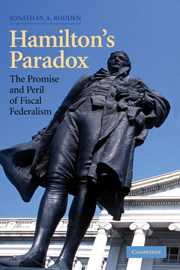Book contents
- Frontmatter
- Contents
- Preface
- Acknowledgments
- 1 INTRODUCTION AND OVERVIEW
- 2 PROMISE AND PERIL: INTELLECTUAL HISTORY
- 3 SOVEREIGNTY AND COMMITMENT
- 4 THE POWER OF THE PURSE: INTERGOVERNMENTAL GRANTS AND FISCAL DISCIPLINE
- 5 DISEASE OR CURE? POLITICAL PARTIES AND FISCAL DISCIPLINE
- 6 AN APPROACH TO COMPARATIVE CASE STUDIES
- 7 FISCAL FEDERALISM AND BAILOUTS IN POSTWAR GERMANY
- 8 THE CRISIS OF FISCAL FEDERALISM IN BRAZIL
- 9 THE CHALLENGE OF REFORM IN FEDERATIONS
- 10 THE ORIGINS OF SUBNATIONAL SOVEREIGNTY
- 11 CONCLUSIONS
- References
- Index
- Titles in the series
1 - INTRODUCTION AND OVERVIEW
Published online by Cambridge University Press: 14 January 2010
- Frontmatter
- Contents
- Preface
- Acknowledgments
- 1 INTRODUCTION AND OVERVIEW
- 2 PROMISE AND PERIL: INTELLECTUAL HISTORY
- 3 SOVEREIGNTY AND COMMITMENT
- 4 THE POWER OF THE PURSE: INTERGOVERNMENTAL GRANTS AND FISCAL DISCIPLINE
- 5 DISEASE OR CURE? POLITICAL PARTIES AND FISCAL DISCIPLINE
- 6 AN APPROACH TO COMPARATIVE CASE STUDIES
- 7 FISCAL FEDERALISM AND BAILOUTS IN POSTWAR GERMANY
- 8 THE CRISIS OF FISCAL FEDERALISM IN BRAZIL
- 9 THE CHALLENGE OF REFORM IN FEDERATIONS
- 10 THE ORIGINS OF SUBNATIONAL SOVEREIGNTY
- 11 CONCLUSIONS
- References
- Index
- Titles in the series
Summary
No one can appreciate the advantages of a federal system more than I. I hold it to be one of the most powerful combinations favoring human prosperity and freedom. I envy the lot of the nations that have been allowed to adopt it.
Alexis de Tocqueville, Democracy in AmericaI should wish you to have as many [states] as you now have palatinates. Create in each of these states as many regional administrations. Perfect the organization of your dietines, granting them wider powers within their respective palatinates.
Jean-Jacques Rousseau, The Government of PolandThe probable evil is that the general government will be too dependent on the state legislatures, too much governed by their prejudices, and too obsequious to their humours; that the states, with every power in their hands, will make encroachments on the national authority, till the union is weakened and dissolved.
Alexander Hamilton, Remarks in the New York Ratifying Convention, 1788Alexis de Tocqueville was not alone. Federalism, especially the American variety, is one of the world's most admired and copied political innovations. Starting at least with Montesquieu, political philosophers have pointed out the advantages of decentralized, multilayered government structures and, at least since Rousseau, advocated their adoption in a wide variety of settings around the world. Tocqueville's enthusiasm and Rousseau's practical advice have been taken up with renewed vigor in the late twentieth century, as transitions from centralized authoritarianism to democracy in countries from Eastern Europe to Latin America and Africa have been marked by the decentralization of authority to state and local officials.
- Type
- Chapter
- Information
- Hamilton's ParadoxThe Promise and Peril of Fiscal Federalism, pp. 1 - 14Publisher: Cambridge University PressPrint publication year: 2005

